
What Fruits and Vegetables Can Chickens Eat?
By: Plain Direct
March 8th 2023, 12:00:00 am
Feeding chickens scraps is a great way to give your flock extra nutrients and reduce waste. As all chicken owners know, these birds are omnivores that will eat almost anything you give them, so how do you know which fruits and vegetables are safe for them to eat? While no fruit or vegetable should make up your flock's whole diet, there are many fruits and vegetables that make wonderful treats for your flock and promote healthy living. Keep reading to learn what produce you can give your chickens and what you should avoid.
Fruits Chickens Can Eat
Grapes & Raisins
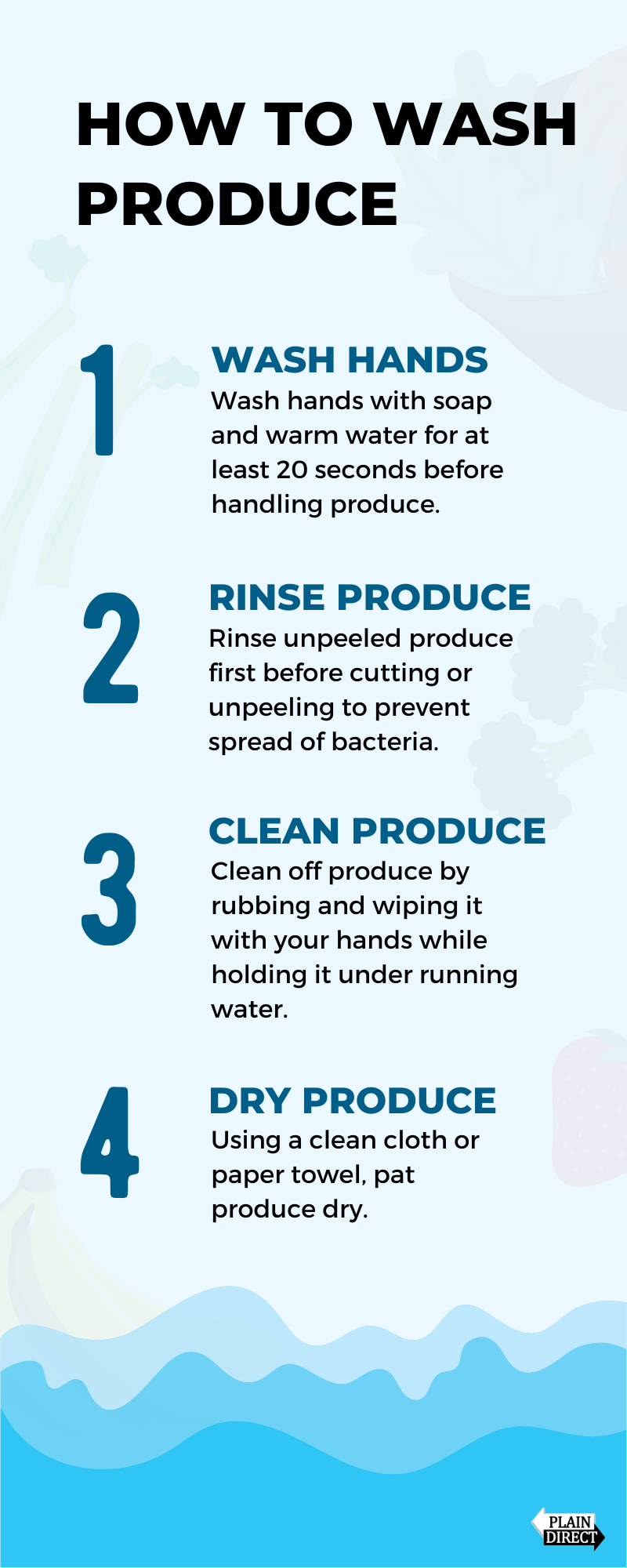
While grapes are toxic to other animals like cats and dogs, this fruit is harmless to chickens. Chickens can safely eat grape peels but there is an extra step required first before you can do this. You need to fully wash grapes before feeding them to your flock to make sure the fruit is free of harmful pesticides and chemicals. Additionally, grape seeds aren’t toxic to chickens but can be a choking hazard and should be avoided. If you give your chickens grapes, look for grapes that are seedless, or remove the seeds before giving them to your flock. Although you should avoid letting your chickens eat grape seeds, the stems and leaves of grapes are perfectly fine for your flock to eat.
Chickens generally love the taste of grapes, but this fruit should only be fed in moderation as it’s high in sugar. The same goes for raisins. Raisins aren’t toxic to chickens but they aren’t very healthy for them either. Your chickens won’t get sick from eating raisins, but store-bought raisins are full of sugar and additives that aren’t good for your flock to have. While this fruit is high in sugar it isn’t all bad. Grapes contain vitamin C and vitamin B6 which help chickens with stress management. All in all, grapes are a great occasional treat that your chickens will be happy to snack on.
Bananas & Banana Peels
Bananas are a safe snack to give your chickens. In fact, chickens are known to love bananas. However, bananas are high in sugar and should only be given as an occasional treat. When given in moderation, your chickens will benefit from the potassium, vitamin B6, vitamin C, magnesium, and fiber that are in bananas. These nutrients will help reduce stress, improve sleep, and promote healthy bones. Additionally, Giving your egg-laying hens bananas as a snack will also improve their eggs’ taste and quality!
Just like the fruit inside, banana peels themselves aren’t toxic to chickens and can be eaten. That being said, you’ll want to completely wash banana peels before giving them to your chickens to ensure all chemicals are removed. Another way to do this is by boiling banana peels which will also make the peels softer. To give your chickens the most nutrients possible out of bananas, feed them bananas that are overripe. Not only will your chickens get more nutrients, but overripe bananas are also softer and easier to eat.
Apples
Apples and apple peels are great snacks for chickens and support healthy digestion. While most parts of apples are safe for chickens to eat, you should never feed apple seeds or leaves to your flock. Apple seeds and leaves contain cyanide which is deadly to humans and animals. While the amount of cyanide in apple seeds and leaves is small, they are still toxic and should be removed to be safe. Not only can apple seeds be toxic, but they can also be a choking hazard. Because chickens don’t have teeth, it’s easy for them to swallow a seed whole and choke. To avoid any potential health issues, it’s safest to avoid apple seeds completely. The best way to do this is to remove the core.
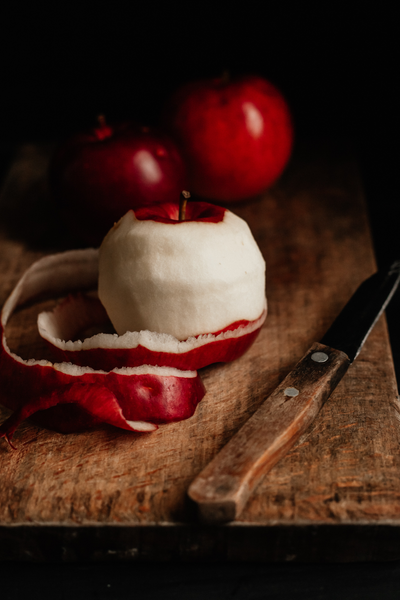
Apples given in moderation to your flock are great for keeping your chickens happy and healthy. Apples help with digestion, blood sugar levels, de-stressing, healthy immune systems, and healthy bones. Apples can also make your chickens feel full for longer which helps prevent overeating and weight gain in your flock. There are a bunch of different ways you can feed chemical-free apples to chickens. First, giving spiraled apple peels to your chickens creates a fun activity for them. You can also cut up apples into pieces that are small enough for your chickens to eat or add dried apple pieces to your flock’s feed.
Pineapple
While chickens can eat pineapple, this fruit is very high in sugar and acidity. If you choose to give your flock pineapple as a treat, this should only be given infrequently, no more than once or twice a week. The acidity levels of pineapples increase when they are underripe and overripe so if you give pineapple to your chickens the fruit needs to be just right. Despite being high in sugar, pineapples still have some great nutritional benefits. For example, this fruit has vitamin C, magnesium, and bromelain. These nutrients help with the following: healthy bones, relaxation, digestion, reducing bad bacteria, healthy energy, quality eggshells, and healthy immune systems. Best of all, feeding pineapple to your flock reduces the risk of parasites.
You can feed pineapple to your chickens in many different ways. These methods include drying out pineapple to reduce acidity, freezing pineapple to help your chickens cool down on hot days, or cutting up pineapple flesh into bite-sized pieces. You shouldn’t put a whole pineapple in your chicken pen as the hard, spikey skin can injure your chickens if they try to eat it. Chickens tend to leave the pineapple core, leaves, rind, and skin untouched, eating just the fruit’s flesh. You should only give 1 or 2 pieces of pineapple to each chicken. Going over this can cause health issues, such as indigestion and diabetes, with the fruit’s high levels of sugar and acidity.
Strawberries
Strawberries are safe for chickens to eat and full of great nutrients. Chickens are known to love eating strawberries and will definitely appreciate these treats. Feeding this fruit to your flock can help with inflammation, blood sugar levels, and heart health as it contains antioxidants, vitamin B9, and vitamin C. While your chickens will love to snack on strawberries, you shouldn’t give them strawberry leaves and stems as these can make them sick.
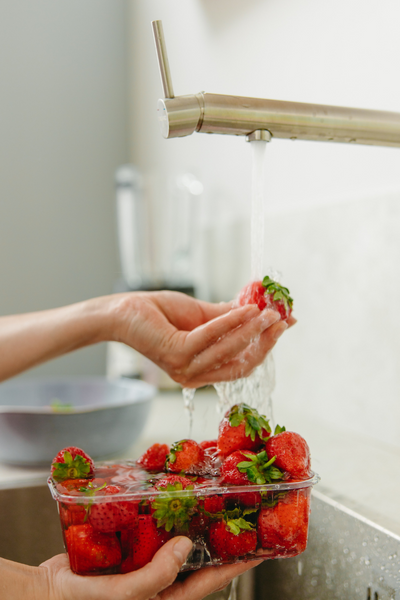
Like other fruits, you want to thoroughly wash off strawberries before feeding them to your chickens so there are no traces of pesticides or chemicals. Strawberries have less sugar when compared to other fruits, but should still only be an occasional treat. You can feed strawberries to your chickens by cutting the fruit into small pieces or freezing them to create a cool snack for hot days.
Blueberries
Blueberries are a popular, healthy snack for chicken owners. This tiny fruit is full of great health benefits like vitamin K, vitamin C, fiber, magnesium, iron, zinc, antioxidants, and minimal calories. These nutrients help in the following health areas: digestion, heart health, infection and cold prevention, inflammation, cholesterol, immune system strengthening, and relaxation.
While blueberries will be a hit among your flock, you should only give them blueberries occasionally as this fruit has a lot of sugar in it. You’ll know if your chickens are eating too many blueberries if they start having issues with diarrhea, a decline in egg production, and low energy. So how often can you give your chickens blueberries as a snack? You can treat your flock to blueberries around 2 or 3 times a week, giving each chicken only 2 or 3 blueberries each. Just make sure you wash them completely beforehand so they’re chemical-free!
Watermelon & Watermelon Rinds
Every part of the watermelon is safe for your chickens to eat as long as the skin has been thoroughly washed to remove pesticides and chemicals. Chickens will generally leave the rind and skin behind so you’ll want to remove these leftovers to avoid rotting and attracting predators. Additionally, watermelon is full of water which is great for keeping your flock cool and hydrated. This fruit has many nutrients that will benefit your chickens in many ways. These nutrients include antioxidants, magnesium, potassium, fiber, vitamin C, vitamin B6, and vitamin A. While underripe watermelons won’t hurt your chickens, there will be more nutrients in ripe melons.
Vegetables Chickens Can Eat
Broccoli
Broccoli is full of nutrients that have great benefits for your flock. This vegetable has vitamin K, calcium, vitamin C, potassium, fiber, and a low-calorie count. By feeding chemical-free broccoli to your chickens, you’ll be increasing their egg production, helping with their immunity, keeping their feathers healthy, promoting healthy muscles, reducing bad bacteria, helping digestion, and reducing the risk of overeating. However, giving your chickens too much broccoli can lead to health problems such as too much fiber and goitrogens, a naturally occurring substance found in broccoli that can be toxic if a lot has been consumed.
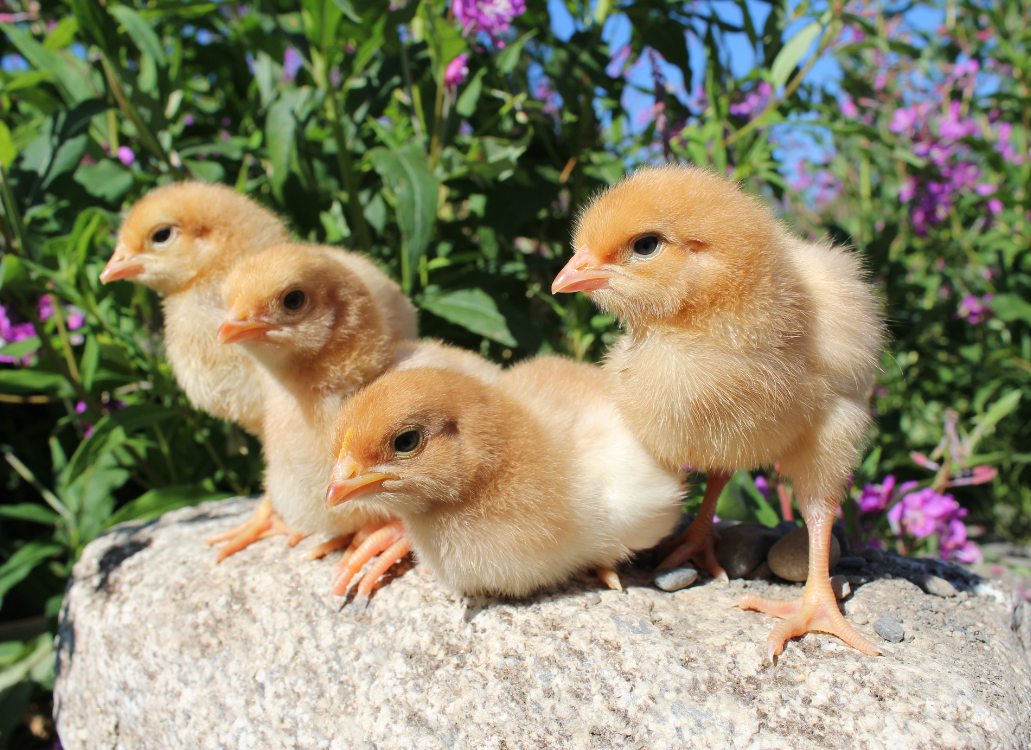 Broccoli should only be an addition to your flock’s regular feed as broccoli alone cannot provide them with all the nutrients they need. As a snack, this vegetable can be fed to your chickens around 1 to 3 times a week. Broccoli can be served cooked or raw, but should never have any salt, seasonings, butter, garlic, onions, or oil added to it. Not sure how much broccoli you’ll need? You can expect to give 1 head of broccoli to every 3 or 4 chickens. Ways to serve broccoli to your flock include cutting up the vegetable into bite-sized pieces or placing the entire broccoli head in their pen for them to pick at.
Broccoli should only be an addition to your flock’s regular feed as broccoli alone cannot provide them with all the nutrients they need. As a snack, this vegetable can be fed to your chickens around 1 to 3 times a week. Broccoli can be served cooked or raw, but should never have any salt, seasonings, butter, garlic, onions, or oil added to it. Not sure how much broccoli you’ll need? You can expect to give 1 head of broccoli to every 3 or 4 chickens. Ways to serve broccoli to your flock include cutting up the vegetable into bite-sized pieces or placing the entire broccoli head in their pen for them to pick at.
Pumpkin & Pumpkin Seeds
Pumpkins, either cooked or raw, are completely safe for chickens to eat. There’s no harm in feeding your flock chemical-free pumpkin flesh, skin, leaves, rind, vines, seeds, or stems. Chickens generally love pumpkins and their seeds, happily pecking away at a whole pumpkin until it’s gone. You can feed pumpkin to your flock by either giving them an entire pumpkin or cutting a pumpkin in halves or smaller sections for them to peck at. Fresh pumpkin is very healthy for chickens but still needs to be given only in moderation. Chickens get vitamin A from eating pumpkin, a nutrient that helps with their immune systems. Pumpkins also contain vitamins B and C that help with development and stress management, as well as vitamin E which reduces the risk of your chickens getting wry necks.
You don’t need to make any changes to pumpkin seeds when feeding them to your flock. Chickens will peck away and eat the seed shell on their own. However, just make sure there aren’t any additives or seasonings on the pumpkin seeds. Additionally, you’ll want to provide grit along with pumpkin seeds to make them easier to eat. Like pumpkins, pumpkin seeds are full of great nutrients and health benefits for chickens. Pumpkin seeds have zinc, vitamin E, and potassium. These nutrients help with your flock’s immune systems, growth, and development. You can give your laying hens pumpkin and/or pumpkin seeds 2 weeks before they lay their eggs to help with healthy development and egg quality.
Tomatoes
Chickens can eat tomatoes but only when they’re ripe and only certain parts. Your chickens should never be given underripe tomatoes, green tomatoes, tomato vines, tomato stems, or tomato leaves. Tomatoes are nightshade plants and a poisonous toxin called solanine can be found in their leaves, stems, and vines. If your chickens consume tomato leaves, stems, or vines they can experience health problems such as lethargy, cognitive issues, indigestion, diarrhea, and even death. If your chicken eats a toxic part of a tomato plant, you need to seek veterinary help right away. To safely feed your chickens tomatoes, avoid any parts of the plant and vegetable that are green.
Chickens can eat raw and cooked chemical-free tomatoes as long as there are no additives like salt, seasonings, oil, onions, garlic, or butter. While most of your chickens will enjoy the taste of tomatoes, you will most likely have some chickens that aren’t fans. If you decide to feed tomatoes to your flock, a few small pieces per chicken is ideal.
Carrots
 Every part of the carrot is completely safe for chickens to eat. This vegetable is full of water which will keep your flock hydrated and comfortable. These nutrient-dense vegetables are very healthy and contain fiber, vitamin B6, very few calories, vitamin A, vitamin K1, potassium, biotin, and antioxidants. By occasionally giving your chickens carrots you’ll help their metabolism, digestion, energy levels, liver health, bone health, and blood pressure levels.
Every part of the carrot is completely safe for chickens to eat. This vegetable is full of water which will keep your flock hydrated and comfortable. These nutrient-dense vegetables are very healthy and contain fiber, vitamin B6, very few calories, vitamin A, vitamin K1, potassium, biotin, and antioxidants. By occasionally giving your chickens carrots you’ll help their metabolism, digestion, energy levels, liver health, bone health, and blood pressure levels.
Chemical-free carrots can be served to chickens either raw or cooked. You can choose to cut carrots up into smaller pieces, shred the carrots, or give whole carrots to your flock and let them enjoy the activity of breaking up the vegetable. Be aware that if you give your chickens carrots frequently, they may only want to eat carrots and stop eating their chicken feed. While carrots are healthy additions to your flock’s daily feed, chickens cannot get all their essential nutrients from carrots alone.
Celery
Celery, along with the rest of the plant, is non-toxic to chickens and has many health benefits. This vegetable is full of nutrients like magnesium, calcium, potassium, vitamin C, vitamin A, vitamin K, fiber, iron, antioxidants, and zinc. Chemical-free celery, when eaten in moderation, will improve the following areas for your chickens: cholesterol, hydration, heart health, immune system strength, digestion, and gut bacteria.
While other vegetables like carrots are generally widely loved by chickens, celery is not that way. Not all of your chickens will be fans of this vegetable, but chickens that do like celery will get some great nutritional benefits. That being said, you should avoid giving an entire celery stalk to your chickens as this vegetable is stringy and can cause digestion issues if large pieces are consumed.
Cucumbers
Cucumbers are harmless to chickens. While the leaves and vines aren’t toxic, be aware that your chickens most likely won’t eat these parts. If any leaves or vines are left behind, throw them away to prevent rotting, mold, and predators. Giving your flock thoroughly washed, chemical-free cucumbers is a great way to keep them hydrated as these vegetables are full of water. In addition to containing a lot of water, cucumbers have the following nutrients: vitamin C, potassium, magnesium, fiber, vitamin K, and vitamin A. These nutrients support healthy digestion, immune systems, bones, vision, and reproduction. Similarly, cucumber seeds are known for aiding in the removal of worms in chickens.
While cucumbers are very healthy for chickens to eat, they should only be given as snacks or additions to their regular feed to ensure your chickens are getting all the nutrients and protein they need. The most popular ways to serve cucumbers to chickens are cutting them in half length-wise, cutting up a cucumber into bite-sized pieces, or stringing a whole cucumber up on a string for them to peck at. On hot days, you can cool off your chickens by giving them cucumbers chilled in the fridge or freezer.
Asparagus
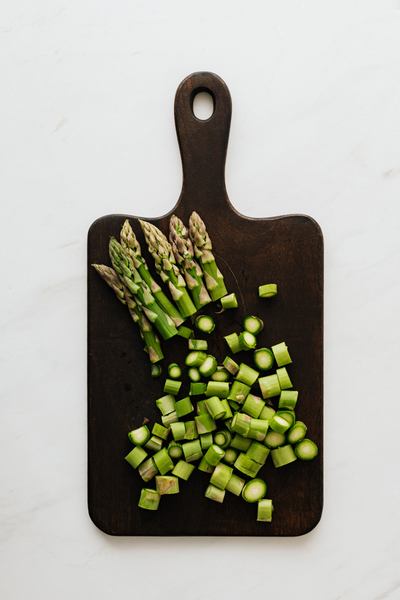 You can feed your flock asparagus either raw or cooked. Just be sure to thoroughly wash it beforehand so it’s free of chemicals and pesticides. Asparagus has many nutrients like fiber, antioxidants, vitamin A, vitamin K, vitamin E, vitamin C, and vitamin B9. These nutrients help with your flock’s stress, immune systems, digestion, gut bacteria, blood pressure levels, bones, and inflammation.
You can feed your flock asparagus either raw or cooked. Just be sure to thoroughly wash it beforehand so it’s free of chemicals and pesticides. Asparagus has many nutrients like fiber, antioxidants, vitamin A, vitamin K, vitamin E, vitamin C, and vitamin B9. These nutrients help with your flock’s stress, immune systems, digestion, gut bacteria, blood pressure levels, bones, and inflammation.
If you are giving raw asparagus to your chickens, it’s recommended to cut it into small pieces since this vegetable can be tough when not cooked. On the other hand, any cooked asparagus that you feed to your flock should be free of additives like seasonings, salt, butter, and oil. If you give asparagus to your laying hens, be aware that overconsumption can change the taste of their eggs. You should feed asparagus to your flock in moderation, only giving it to them a few days a week at most.
Overall, remember to make sure you are keeping your chickens’ pens clean and free of any food scraps that go uneaten. By letting leftover food scraps sit in the pen or space around your chicken coop, you can attract predators to your flock. Furthermore, leftover food is likely to rot and grow mold which can make your chickens very sick and cause death. Moderating the amount of fruits and vegetables that you feed your chickens will keep them healthy and protect them against potential predators.
Looking to get more chickens or ready to start your own flock? Browse Plain Direct to find chickens, chicken coops, and pet supplies for sale near you.
Share:
Tags:
No tags yet.